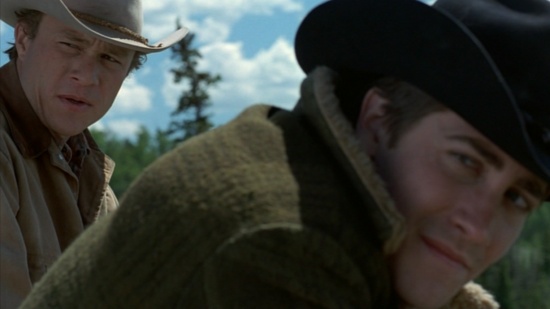Review – Brokeback Mountain (Ang Lee, 2005)

The first thing to get out of the way about Ang Lee’s wonderful Brokeback Mountain is this: it isn’t controversial. I don’t mean that there’s no controversy surrounding it, because unfortunately there is, but the film itself makes no point that should be contentious. It’s a love story that happens to be about two men in 1960s Wyoming, but it isn’t a political tract. Prejudice against homosexuals is a historical circumstance that the film acknowledges, but it’s not really the primary subject matter: it serves much the same plot function that the taboo of a Montague courting a Capulet did in Romeo and Juliet. The film doesn’t treat homosexuality as sensational or taboo; it isn’t overtly political; no politics are preached; and it doesn’t demonise any group or person. The controversy about the film arises purely from the prejudice audiences bring to it: those who have a problem with homosexuality will have a problem with Brokeback Mountain, but nobody else will. Indeed, as Phillipa Hawker pointed out in her review for The Age, it is perhaps the old-fashioned nature of the film that has actually most disturbed conservatives and homophobes. If Lee had treated his material as shocking, it would probably have passed with less comment. Instead, the film simply takes acceptance of its subject matter as a given, and aims clearly at mainstream audiences.
Certainly the film’s characters would not consider themselves part of some larger gay cause. Ennis (Heath Ledger) and Jack (Jake Gyllenhall) meet in 1963 when they are hired to tend sheep together on Brokeback Mountain, a (fictional) wilderness in Wyoming. Ennis is quiet and reserved, while Jack is more demonstrative, but the two form a bond that soon crosses into physical intimacy. At summer’s end the two men go their own ways, and both try to steer their lives along the heterosexual trajectory that is expected of them, marrying and having children. Yet over the subsequent two decades they continue to love each other, and the film tracks the toll that their self-denial takes on them and those around them.
Lee’s film is, as I said, traditional in its storytelling: artistically, it belongs in a tradition of epic, scenic, romantic drama. This is a genre of filmmaking that doesn’t normally hold great appeal to me, but Brokeback Mountain is so beautifully told that it can’t be dismissed as just another middlebrow story of doomed love set in spectacular surrounds. The screenplay – by The Last Picture Show writer Larry McMurtry and Diana Ossana, from a short story by Annie Proulx – is compassionate and moving without ever stacking the deck unfairly for the protagonists. For example, in its portrayal of Ennis’ marriage, it never tries to make Ennis a victim: there’s no shirking the fact that Ennis is mistreating his heartbroken wife (Michelle Williams). Heath Ledger is extremely impressive as Ennis, who tries to bear his burden of denial with stoic fortitude, but can’t help lashing out at those around him. Ledger is transformed in the role, capturing not only Ennis’ broad accent and surly demeanour, but also the seething torment underneath. Jake Gyllenhaal’s performance as Jack isn’t as showy, but it’s also note-perfect. The bond between the two is convincing, and the highs and lows of the relationship are absorbing.
Lee, coming back from the patchy reception to Hulk, confirms his justified reputation as a master director capable of seamlessly moving from genre to genre. Brokeback Mountain is beautiful to look at, with the breathtaking imagery supported by a gently atmospheric score by Gustavo Santaolalla (which is likely to become the new millennium’s answer to Mark Knopfler’s much-played score for Local Hero). Perhaps more crucially, Lee’s assured grasp of narrative means that the film’s challenging structure, which requires a complete shift in approach halfway through, never defeats him. In the early stretches, Lee has to plausibly show how these two steadfastly macho men could ever come to the point of recognising their mutual attraction. Their opening trip to Brokeback Mountain is therefore told in a leisurely, naturalistic style that maximises atmosphere and emphasises small moments that pass between them. In the second half of the film, however, a great deal of time passes, forcing Lee to work in a kind of shorthand: a single terse exchange, for example, signals years of deterioration in a marriage. This kind of storytelling is very hard to pull off, because the “highlight reel” effect can be distancing: the audience feels they’re seeing only selected moments rather than living events alongside the characters. Yet Brokeback Mountain never feels stilted or artificial, and its characters certainly never feel remote.
The emotional journey Lee takes the audience on is intense and fulfilling. The film’s final conclusion is built on a perfect visual metaphor for the bond between the two men that is more satisfying than any more conventional catharsis could have been. The film is deeply affecting, but not through manipulation: it simply lays bare the intense sadness of lives left unfulfilled for no good reason.